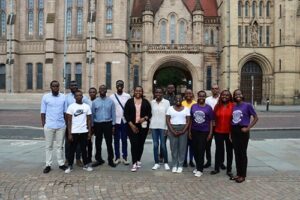University hosts sector-leading reciprocal student visits between Manchester and Kisii
 Over the Summer, the University hosted visiting students from Kisii, Kenya as part of a sector-leading exchange programme.
Over the Summer, the University hosted visiting students from Kisii, Kenya as part of a sector-leading exchange programme.
The University facilitated fifteen Kenyan students attending a summer school in 2024 as a reciprocal arrangement, overcoming major barriers in funding and visa organisation. This follows a previous cohort of UK students visiting Kisii as part of earlier exchange programmes.
“The visit has been amazing,” said one Kisii student. “We’ve gotten to experience a lot of teaching in Manchester, and it has been somewhat different from how we were taught back in Kenya.
“Manchester is a very, very beautiful town. The people are very, very friendly. We get smiles from everyone. Although the weather is not what we expected, we’ve had really interactive sessions, especially in our lectures. We don’t often get opportunity to learn in groups, share ideas, or talk to our lecturers so informally.”
“Even though many groups have highlighted the need for parity and bi-directionality in student exchange programmes, this is the first time it has been achieved, overcoming major barriers in funding and visa arrangements,” said Professor Mahesh Nirmalan, Vice Dean for Social Responsibility and Public Engagement in the University’s Faculty of Biology, Medicine & Health.
Exchange programmes with full bi-directionality and parity help all students taking part in such programmes acquire transferable skills in cultural competence, empathy, resilience, and the opportunity to experience and work within different healthcare systems. “Too often it is one way from a high-income country to a low and middle-income country, and not the other way,” said Keith Brennan, Vice Dean for Internationalisation in the Faculty of Biology, Medicine & Health.
To date, 25 UK students have done their electives in Kisii between 2023 and 2024. Manchester students were given the opportunity to work with their fellow Kisii students to implement ‘Early Warning Scores’ in surgical wards in Kisii hospitals, promoting a positive influence on local health services.
“I’ve learned that as human beings we can explore our horizons and discover new opportunities in the spirit of community work and, of research,” said one student. “I think the most important skill that I have learned from this whole experience is how to interact with people and form useful connections. I sometimes struggle interacting with people, but I have been able to form new friendships from all over the world.”
We asked: Is there anything the Kisii students would recommend to other students completing future exchange programmes from Kenya? “Bring warm clothing with you!” they replied.
The Faculty of Biology, Medicine and Health would like to thank the Philanthropy office for securing funding for the exchange visits, and the Summer School team for all their hard work in making this a success.
